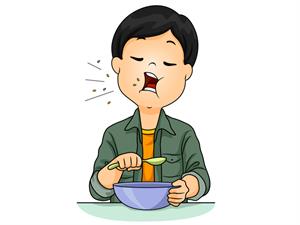PDF chapter test TRY NOW
Grown-ups say things like:
Speak up
Don’t talk with your mouth full
Speak up
Don’t talk with your mouth full
Explanation:
The poem "Chivy" revolves around the phrases that grown-ups tell children on a daily basis. The poem takes the format of having phrases arranged one below the other and looks like orders. The phrases are not said politely, rather they are meant for the child to obey immediately. The first phrase that the poet mentions is "Speak up". This is mostly used by adults when a child is shy or introverted. Children can have a fear of talking in front of people due to various reasons. For some, it is fear of being laughed at. For some, it is a fear of getting things wrong.

Shy child, motivated to talk
Rather than understanding the child's situation and motivating them to get rid of the fear, most adults pressure them to speak up. They don't realise that it is perfectly normal to have fears. One can work on any fear with the right kind of help. But blindly asking them to do the thing that they fear without addressing the real issue may only aggravate the situation.
The same adults who pester a child to speak up, when he is not ready, also ask him to not speak, when his mouth is full. It is true that when one speaks while eating, digestion problems can be created. But the problem is that children are only given orders and have no idea of the logic behind them. The children are not made to understand that it is a healthy thing to not speak while eating as it might also cause the child spitting food across. The child just internalises the two orders, that he has to speak and not speak. As a result, the child gets visibly confused.

Child speaking with a mouth full of food
Meaning of difficult Words:
| S.No | Words | Meaning |
1 | Chivy | To nag, To irritate |
2 | Phrases | A group of words |
3 | Polite | Humble |
4 | Introverted | Keeping to oneself, shy |
5 | Aggravate | To increase, to worsen |
6 | Pester | To disturb |
7 | Digestion | The breaking down of the food that one intakes |
Reference:
National Council of Educational Research and Training (2007). Honeycomb. Chivy: Michael Rosen(pp. 69-70). Published at the Publication Division by the Secretary, National Council of Educational Research and Training, Sri Aurobindo Marg, New Delhi.
